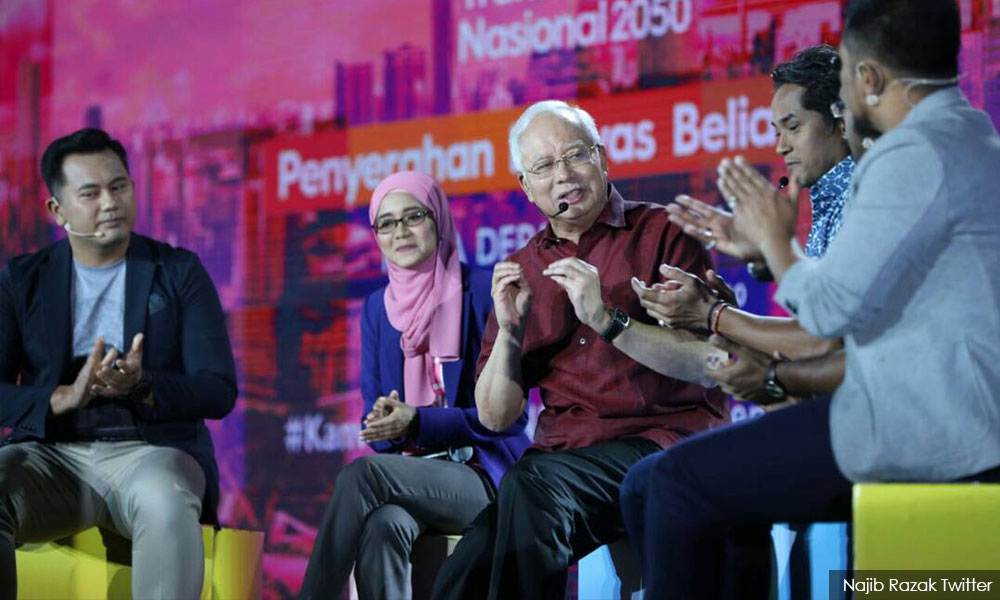LETTER | Prime Minister Najib Abdul Razak proudly presented the National Transformation Programme (NTP) Annual Report 2017 with much-justified fanfare at the Malaysia International Trade and Exhibition Center, in a colourful ceremony on March 24.
He also was interviewed by NTP advisor Idris Jala on a wide range of socio-economic issues, based on the serious concerns raised in a survey of thoughtful Malaysians.
The PM explained that “Malaysia is now on the cusp of rapid change”, and stressed that “the government is determined to drive the country’s development to greater heights in the future”.
He further “urged Malaysians to place their confidence in the efforts undertaken”.
All this is well and good. But many Malaysians believe that while we can celebrate our NTP successes in the past, future progress can be questioned unless we adopt new and fundamental development strategies.
Even the past successes can be qualified, as they have shown some weaknesses that have not been highlighted by the NTP Report.
Actually, the NTP successes have been rightly played up but the pitfalls have been wrongly played down.
How then can we place much more confidence in the government’s ability to sustain and strengthen NTP success in the future? In fact, the NTP Report should have shown more balance and indicated how it planned to overcome our current structural weaknesses to ensure sustainable successes as well.
So let’s examine how the NTP Report could have been better balanced to ensure more sustained successes in the future.
Firstly, while it is true that the economic growth rates and especially the 5.9 percent expansion last year have shown much success, what assurance is there that we will be equally or more successful in achieving high rates of growth in the future? What new strategies do we envisage, to attain faster and sustained economic expansion?

Even the wide public consultations on TN50 do not indicate the vital need for major changes in our socio-economy. It appears more of the same - and this is unwise for future success sustainability.
How can we then assume that we are “no longer stuck in the middle-income trap, given our reluctance to introduce essential competitive policies, to take on our economic rivals in Asean, and indeed, all over the world? The NTP has to undergo more structural changes, in order to sustain our its laudable successes.
Higher growth rates have not sufficiently raised the standards of
living and quality of life of the majority of our Malaysians in the bottom and middle-income groups. In fact, the rakyat has been suffering from low salaries and incomes and steadily rising prices, that have depressed their sense of well being.
The Happiness Index for Malaysia does not show that our people
are really happy. The index could be much higher. Will the government use this UN-sponsored Happiness Index more extensively in our annual budgets and the five-year economic plans, to ensure that high growth rates bring greater benefits to the middle and bottom-income groups?
What is the use of high growth rates when the rich gain much more than the poor and the low-income groups? Instead of becoming confident in our economic growth, the rakyat could get more depressed and even feel relatively neglected by public policies.
Unemployment should decline and not rise with higher economic growth. But among the youth and especially new graduates, unemployment has been rising. There must be many things that are wrong in our economic planning and implementation, for this sorry state of affairs. For instance, our education system at school and also tertiary and university levels should take some
criticism for this sad situation. Is there an avoidable mismatch in our labour market? Are our new graduates weak in critical thinking, subject content and communicating in the English language?

Are we churning out graduates who meet the rapidly changing demands of
the growing challenges of the digital economy? If this is the case, can the unemployed feel confident of benefitting from the projected greater heights in the future? We have to be careful to avoid social unrest emerging from this dissatisfied sector of our society.
Our national institutions are vital to our survival and further success. The sustainable success or failures of our institutions were unfortunately not emphasized in the NTP report.
Economic growth, better income distribution, higher quality of life and indeed greater happiness, cannot be built up and adequately sustained, without having stronger national institutions.
Thus, more strenuous efforts have to be made by the government to strengthen our national institutions as a high priority.
The Parliamentary system, the Judiciary, the Election Commission,
the MACC, the whole civil service, including the police force, and inter alia, the fight against money politics have to be severely stepped up. This is essential to strengthen and sustain national unity, peace and security and racial
and religious harmony. The NTP report should focus on the soft side of development and not mainly on the hard infrastructure development, to achieve sustained success.
The 17 United Nations sustainable goals, including our environmental protection, could have been given much more prominence in our NTP report.
Again, for what use is our emphasis on economic growth, if we inadvertently and carelessly destroy our God-given blessed Mother Earth?
All the Infra-rakyat will become counterproductive if we don’t give greater priority to providing a more environmentally sustainable future for our posterity.
We hope future NTP reports will stress not only growth and infrastructure projects, but move more purposely on providing the basic needs and human rights and attaining the UN sustainable goals, to more directly benefit our rakyat as a whole and for all Malaysians. We need a more bottoms-up and less top-down approach in the socio-economic and even political development in Malaysia.
Only then, Malaysian talents and skilled workers who are now in very short supply, will be encouraged to stay at home and contribute to a more progressive Malaysia. Without more Malaysian talents, there will be slower economic growth and even less investment, due to a continuing damaging brain drain to Singapore, UK, Australia and other countries all over the world.
Conclusion
The NTP Report launched by the prime minister is most welcome because it contains many successes. But unless more structural and long-term reforms, as indicated above, are introduced soon after the GE14, the past NTP successes will not be readily sustainable, for long. We cannot afford to follow past policies that served us well before, but not now and particularly in the future.
We have to transform more radically and change direction to truly break out of the middle-income trap. If we don’t do so soon, then our economy, will just chug along, like an old tired locomotive.
In fact, as a nation, we may decline in our prospects for further progress and national well being. These structural reforms must be introduced by the NTP, as soon as possible to meet our national challenges and aspirations for TN 2050!
We can’t afford to delay, as it may then be too late. But if we take the challenge to transform sooner rather than later and at a faster pace, then a bright future awaits us all and Malaysia ‘s success will shine.
For this reason, we must all vote wisely, for the best election candidates, regardless of race and religion or monetary incentives! God bless Malaysia's future!
RAMON NAVARATNAM is the chairperson of the Asli Center for Public Policy Studies.
The views expressed here are those of the author/contributor and do not necessarily represent the views of Malaysiakini.

